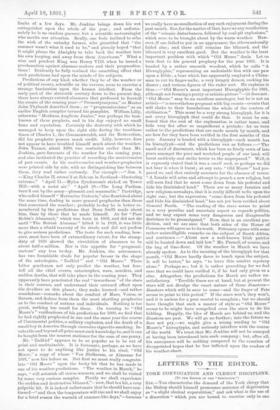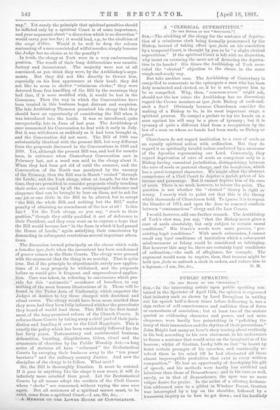LETTERS TO THE EDITOR.
YORK CONVOCATION AND CLERGY DISCIPLINE.
[To THE EDITOR OF T5 " SPEOTATOE."]
Sin,—You characterise the demand of the York clergy that the Bishop should himself pronounce sentence of deprivation as a slight clerical superstition," and ask what is the use of a discretion " which you are bound to exercise only in one way." Yet surely the principle that spiritual penalties should be inflicted only by a spiritual Court is of some importance, and your argument about " a discretion which is no discretion " would carry you too far; it would lead, e.g., to the abolition of the congh d'aire. Would it be well to drop the solemn sentencing of a man convicted of wilful murder, simply because the Judge has no choice as to the penalty P In truth, the clergy at York were in a very embarrassing position. The result of their long deliberations was unsatis- factory and inconsistent. The majority were not at all convinced, as you think they were, by the Archbishop's argu- ments. But they did not like directly to thwart him, especially on his first appearance at their head ; they did not like to seem to shelter " criminous clerks ;" they were deterred from free handling of the Bill by the warnings they had that, if it were meddled with, it would be lost in the Commons. Then the way in which the Convocations have been treated in this business begat distrust and suspicion. The late Archbishop Thomson promised his clergy that they should have an opportunity of considering the Bill when it was introduced into the Lords. It was so introduced, quite unexpectedly, late in June of last year. The Archbishop at once summoned his Convocation to deal with it early in July. But it was withdrawn as suddenly as it bad been brought in, and the Convocation did not meet. The Bill of 1890 was substantially identical with the present Bill, but very different from the proposals discussed in the Convocations in 1888 and 1889. Yet, although the present Bill was, and had for months been, in existence when Canterbury Convocation met in February last, not a word was said to the clergy about it. When they had been got rid of until the summer, and the Convocation of the North was paralysed by the vacancy of the Primacy, then the Bill was in March. " rushed " through the Lords ; and the York clergy, when at length, for the first time, they are permitted to consider proposals vitally touching their order, are urged by all the archiepiscopal influence and eloquence that can be brought to bear on them, not to ask for one jot or one tittle in the Bill to be altered, but to accept " the Bill, the whole Bill, and nothing but the Bill," under penalty of obtaining no amendment of the law at all ! Is this fair ? Yet the York clergy, as you say, " stuck to their position," though they oddly qualified it out of deference to their President, and they even went on to express a hope that the Bill would become law " in the form in which it bad passed the House of Lords," again satisfying their consciences by demanding in subsequent resolutions several important altera- tions.
The discussion turned principally on the clause which voids a benefice ipso facto when the incumbent has been condemned of graver crimes in the State Courts. The clergy were pressed with the argument that the thing is no novelty. , That is quite true. But if the principle he objectionable, surely new applica- tions of it may properly be withstood, and the proposals before us would give it frequent and unprecedented applica- tion. Care was taken, in referring to enactments which pro- vide for this " automatic " avoidance of benefices, to say nothing of the most famous illustrations of it. These will be found in the Tudor Acts of Uniformity, which empower the Judges at Assizes to try those charged with doctrinal and ritual errors. The clergy would have been more startled than they were, had they been fully informed whither the precedents they heard of would lead them. This Bill is the first instal- ment of the long-promised reform of the Church Courts. It reforms those Courts by taking away a chief part of their juris- diction and handing it over to the Civil Magistrate. This is exactly the policy which has been consistently followed for the last forty years. Testamentary and matrimonial business, defamation, brawling, dilapidations, tithes, ritual and the ornaments of churches by the Public Worship Aet,—a long series of statutes all have " reformed" the Ecclesiastical Courts by sweeping their business away to the " ten years' barrister" and the ordinary country Justice. And now the discipline of the clergy is to follow. What next ?
Sir, the Bill is thoroughly Erastian. It must be resisted. If it pass in anything like the shape it now wears, it will do infinitely more mischief than good. Let the Ecclesiastical Courts by all means adopt the verdicts of the Civil Courts where " clerks " are concerned, without trying the case over again. But all sentences of a' spiritual nature must, to be valid, come from a spiritual Court.—I am, Sir, ac.,
A MEMBER OF THE LOWER Housu oz' CONVOCATICiii.



































 Previous page
Previous page